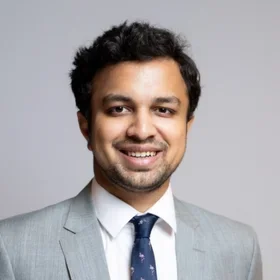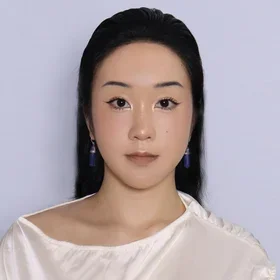Robert Kleiman is a recent graduate of Columbia’s Executive Master of Science in Technology Management program. As a consultant, he works as a program manager in global brand and marketing for Google Developer Communities, where he helps technologists around the world engage with Google’s technologies and community programs. He discusses his background in tech from Kaplan to Major League Hacking to Adobe to Google, his work on Google’s DevFest 2021 and 2022 Solution Challenge, and how he is applying the theory and practice learned in Columbia’s program to his daily practice and future career outlook.
What led you to pursue the executive master’s degree? Why from Columbia, specifically?
Columbia’s program offered a path to cultivate effective leadership skills to address the needs of the communities I serve. I decided to pursue an executive master’s degree from Columbia because I wanted to level up as a leader and propel my career forward. I believe pursuing an Executive M.S. in Technology Management at Columbia University equipped me to stay on the cutting-edge, meet the challenges of our moment, and lead teams through complexity.
The curriculum lays a foundation for responding to the forces transforming enterprises by understanding the nuances of managing people, allocating resources, and understanding financial models. Among the many attributes that attracted me to Columbia’s program, the department’s expertise, structured mentorship, and academic rigor drew me in the most. I’ve grown into a more competent leader ready to meet the diverse needs of technology businesses. I’m thrilled and delighted to be a Columbia Lion!
What do your responsibilities entail? Are you able to apply what you have learned at Columbia in your day-to-day work?
I’ve worked in technology for some time, including in edtech at Kaplan, and, more recently, in Developer Relations and Developer Advocacy at Major League Hacking and Adobe. Upon completing the master’s program, I accepted a role at Advanced Systems Group, where I serve as a global program manager of brand and marketing for the Global Communities team at Google. I am placed and officially in employ of Advanced Systems Group, LLC.
My team serves an expansive audience of engineers and technologists and offers developers opportunities for world-class networking, product-training, collaboration, and inspiration. The role represents a promotion in my increased scope of work responsibilities and a new chapter in my professional career.
My chief responsibilities focus on enabling the success of the end-user and helping technologists around the world engage with Google’s technologies and community programs. I elevate the Google brand, plan and execute marketing activities, facilitate communication and support, drive global community campaigns, and develop and track campaign reporting. I shape communication strategy and projects across internal teams and external players.
Through all these endeavors, the importance of communicating the business value–which I learned in the Evolving Role of the CIO, the course taught by Craig Cuyar–remains at the center of how to “tell the story” of how the work impacts and relates to overarching company goals.
What aspect of the curriculum did you feel that you were able to apply at your workplace?

I led the branding and operational efforts to launch Google’s 2022 Solution Challenge, in which students are invited to solve one of the seventeen UN Sustainable Development Goals using Google technology and products. In establishing the Solution Challenge’s global contest for students, Julia Brickell’s Technology and the Law course enabled me to intelligently speak on matters related to records management and privacy plans.
I was able to jump headfirst into the project and work with my team to shepherd us through the review process. The Technology Management program helped me excel in this role and on the project, giving me the resources and knowledge about specific considerations regarding data retention plans and privacy design. I worked directly under the legal counsel from the outset and partnered with them to think through the privacy design and legal implications of the project up through launch. With their guidance, I helped draft the terms and conditions of the program.
An academic and practical grounding in these topics led me to receiving the recognition and praise of my teammates for speedy and competent approval and launch. Over 14,000 students registered for the contest, with nearly 1,000 projects submitted to the ongoing judging process.
I also made an impact by supporting the wrap-up of an annual conference, DevFest. Marking the tenth year of the program, DevFest 2021 culminated as a unifying global initiative, which saw over 450 events in over ninety countries. It helped more than 500,000 developers learn about new technologies, and we’re already laying the groundwork for the next one!
Has the program helped you to define your career journey? Have your aspirations or professional goals changed in any way due to the program?
The program helped me develop an awareness of the connection between change management and one's ability to identify, propose, and drive solutions. One must stay abreast of the shifts. For example, the courses on Strategic Advocacy with Lyle Yorks and Norm Jacknis’ course on Artificial Intelligence and Machine Learning are second to none in terms of their relevance to the changing technology landscape.
Additionally, the Program Management for Technology Executives course with Yves Leon helped provide tools and strategies I use daily to competently manage a suite of projects and report on the status of each initiative. These courses helped me have a proper foundation of skills while I continue to find ways to stay connected to the technology and communicate my value as I grow beyond an individual contributor role.
Walk us through the process of your master's project. What problem were you aiming to solve?
My thesis project "Switch&Go" centered on a personal productivity application that aimed to solve the problem of account fatigue–which is, the condition we experience as a by-product of the rising number of online apps and services we use to manage work, school, and personal activities. The tool introduced a new way for consumers to interact with their data across applications. It also allows users to seamlessly switch between applications, organize them by project, and view context-driven insights, giving users more control over their browsing experience.
Though my thesis project remains exploratory, the learning, preparation, and rigorous analysis required to defend the work will set me up for success in the long-term. My mentor Piyush Singh, of Terrene Labs, helped tremendously with advice around metrics, understanding the mechanics of running a software as a service (SaaS), and the nuances of staying scrappy. The project provided a rich learning experience. For now, I plan to continue building expertise and relationships in my current organization.
What did you think of the oral defenses? What was that experience like?
The faculty started pushing me to excel right from the start. As one of the younger students in my program’s cohort, I was often in awe of my esteemed classmates and faculty, but I felt honored and proud to have earned my seat. The incisive and constructive comments on my thesis defense allowed me to refine and improve my approach.
The judge’s questions and commentary quickly illustrated how the program was helping me bridge the gap in my communication and grow as a leader. The feedback and coaching concentrated on the defenses might be more than most people receive in a year, and I don't take that experience for granted. The experience positively impacted my professional development by developing my ability to communicate succinctly, prepare presentations for the C-Suite, and receive constructive feedback.
As the program concludes, I look forward to applying these learnings in the field and pushing myself professionally. To that aim, I relished the opportunity to learn from the mentors’ practical experience in our lectures and coursework and value the mentorship.
I have tremendous gratitude for the guidance and mentorship during my master’s program journey. The rich curriculum and learning environment shaped me, and now, I’m ready to go forth and apply my learnings!
I'm excited to tackle challenges. I received terrific support during the Technology Management program. Each professor’s expertise and dedicated teaching in the executive seminar impacted me. The learnings and experiences from the program will shape my career in many ways for a long time.
Learn more about Columbia's Executive M.S. in Technology Management program.


